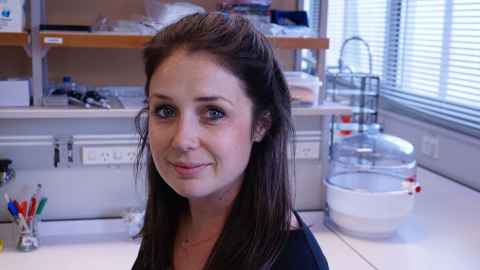Science's resident shape-shifter
5 December 2017
Dr Laura Domigan, Research Fellow in the School of Biological Sciences, discusses masquerading as a biochemist, encouraging proteins to use their transferable skills, and avoiding camels in Marrakesh.

For Dr Laura Domigan, “working with people from different disciplines, backgrounds and cultures”, along with the opportunity to travel and the excitement of solving a puzzle, are some of the things she enjoys most about her research.
Laura describes her work as “repurposing proteins to forget their day job and work for me”. Specifically, Laura uses proteins from the eye lenses of hoki fish, and turns them into high tech materials.
“I use proteins that would otherwise be wasted. At the moment my focus is using these proteins to make useful materials and glue for eye surgery,” she explains.
The variety of her day-to-day activities is also something that Laura enjoys. Some days she and her team extract the lenses from hundreds of fish heads – and other days they might make precise molecular measurements on how to attach useful things to their materials. “And then there is the mechanical testing of the final prototypes. We ask ourselves, ‘Are they as good as the commercially available materials that are not made from sustainable sources?’,” she adds.
A recent recipient of a Ministry for Business, Innovation and Employment (MBIE) Endeavour Smart Ideas grant, Laura says she happily switches disciplines to suit her investigative needs:
“I’m not really a biochemist at all, but don’t tell anyone! While my PhD was a cross-faculty project in Biochemistry and Electrical Engineering, my post-doc was in a Biomedical Engineering team.
“I like using the discipline I need to answer the question I’m asking, without identifying with a particular science tribe,” she says.
As a new researcher the main challenge is building a team. That's the advantage of working at a university – you have a constant source of young people with fresh ideas.
Laura’s own “science tribe” includes students and colleagues from across the University, as well as external collaborators. “Half of my students are engineers! I collaborate with academics in the MacDiarmid Institute [for Advanced Materials and Nanotechnology], the Faculty of Medical and Health Sciences, as well as people in industry,” she says.
Laura is enthusiastic about the diversity of her collaborations as they provide her with the breadth of experience her research needs: “It’s been great having students wandering around campus because lots of new ideas spark at the boundaries, and they learn from each other.
“As a new researcher the main challenge is building a team. It’s quite frustrating training a really keen and talented student, only to watch them leave, and then having to start again with a new one! But that’s the advantage of working in a university rather than a Crown Research Institute or biotech company – you have a constant source of young people with fresh ideas,” she says.
The other “constant source” Laura has had to secure is a regular supply of fish eye lenses so she can continue with her work in the future.
“I recently connected with the fisheries industry, which was quite daunting, but actually, the marketing manager of the company I liaised with was quite excited about this new use for his catch. He said, ‘It’s nice to think about something other than fish fingers for a change!’”, laughs Laura.
Long term, Laura hopes to create new materials for ocular surgery that are better, safer and more sustainable than current options. It’s even possible that her work will mean that sutures for the eye can be replaced with transparent glue.
“It took me a long time to decide that science was for me. I also thought about law and business. In the end I chose science because it has the most variety. It gives me the freedom and creativity to explore ideas. And, as it turns out, my research direction has commercial application, so I get to do some law and business too.”
When asked about the piece of advice she’d give to her younger, less experienced research self, Laura is clear: never go to Morocco with your supervisor.
“My PhD supervisor was once offered several hundred camels in exchange for leaving me in Marrakesh!”
We’re glad the trade didn’t work out, because the Faculty of Science would sorely miss its resident discipline shape-shifter.
inSCight
This article appears in the December 2017 edition of inSCight, the print magazine for Faculty of Science alumni.